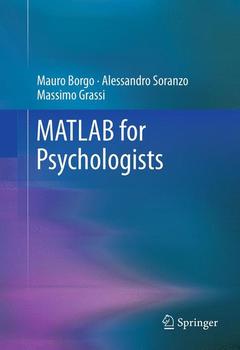MATLAB for Psychologists, 2012

The matrix laboratory interactive computing environment?MATLAB?has brought creativity to research in diverse disciplines, particularly in designing and programming experiments. More commonly used in mathematics and the sciences, it also lends itself to a variety of applications across the field of psychology. For the novice looking to use it in experimental psychology research, though, becoming familiar with MATLAB can be a daunting task.
MATLAB for Psychologists expertly guides readers through the component steps, skills, and operations of the software, with plentiful graphics and examples to match the reader?s comfort level. Using an extended illustration, this concise volume explains the program?s usefulness at any point in an experiment, without the limits imposed by other types of software. And the authors demonstrate the responsiveness of MATLAB to the individual?s research needs, whether the task is programming experiments, creating sensory stimuli, running simulations, or calculating statistics for data analysis.
Key features of the coverage:
- Thinking in a matrix way.
- Handling and plotting data. Guidelines for improvedprogramming, sound, and imaging.
- Statistical analysis and signal detection theory indexes.
- The Graphical User Interface.
- The Psychophysics Toolbox.
MATLAB for Psychologists serves a wide audience of advanced undergraduate and graduate level psychology students, professors, and researchers as well as lab technicians involved in programming psychology experiments.
Chapter 1. Basic operations.- Chapter 2. Data Handling.- Chapter 3. Plotting Data.- Chapter 4. Start Programming.- Chapter 5. A Better Sound.- Chapter 6. Create and Process Images.- Chapter 7. Data Analysis.- Chapter 8. The Charm of Graphical User Interface.- Chapter 9. The PsychToolbox: Video.- Chapter 10. PsychToolBox: Sound, Keyboards and Mouse.
Mauro Borgo received his B.A. and his Ph.D. in Electronic and Telecommunication Engineer in 1999 and in 2003 respectively, both from the University of Padova, Italy. His interests are in signal and data processing for wireless communication. He adapted his competences of signal processing to the multi-sensor/actuators cells systems. He has an international patent on “Multi site- Single CellElectroporation”. He was a lecturer in “Electrical communication” and in “Matlab” at the University of Padova(Italy).
Alessandro Soranzo received his B.A. in Experimental Psychology in 1999 and his Ph.D. in Experimental Psychology in 2004, both from the University of Trieste, Italy. He also did a Post-doc in Vision Sciences at Glasgow Caledonian University (Glasgow, UK). He is senior lecturer in Cognitive Psychology at Teesside University in Middlesbrough (UK). His research interests are in colour perception and psychophysical methods.
Massimo Grassi received his B.A. in Experimental Psychology in 1997 and his Ph.D. in Experimental Psychology in 2003, both from the University of Padova (Italy). He has also been a Visiting Scientist at University of Sussex (UK). He is lecturer in Sensation and Perception at University of Padova (Italy). His research interests are in sound perception, crossmodal perception, and psychophysical methods.
Ouvrage de 284 p.
15.5x23.5 cm
Thèmes de MATLAB for Psychologists :
Mots-clés :
Behavioral Science; Biosignals; Computational Functions; Computer Programming; Data Analysis; Data Collection; Data Handling; Data Types; Data Variables; Debugging; Elegant Programming; Experimental Psychology; Exporting Data; GUI; Graphic User Interface; Import/Export Images; Importing Data; Loops Generation; MATLAB; Matrix; Matrix Laboratory; Neural Networks; Problem Solving; Program Flux; Programming; Programming Language; Psychological Toolboxes; Psychology; Simulation; Small Data Set; Statistics



